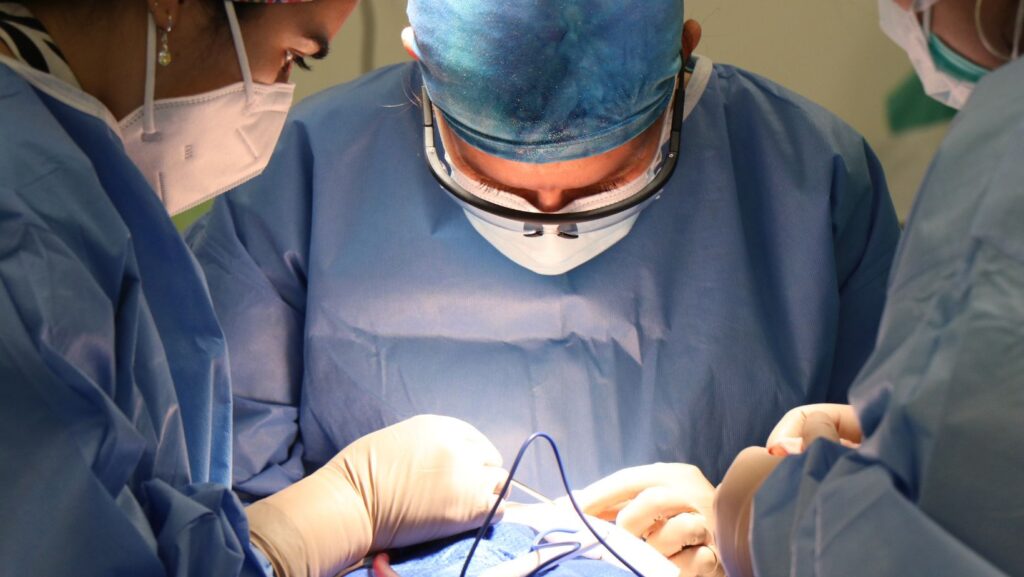Chicago Arbor Eye Institute transforms lives through advanced cataract surgery techniques that restore crystal-clear vision for thousands of patients each year. Dr. Fatima Ali leads our team in delivering personalized cataract treatment that addresses each patient’s unique visual needs and lifestyle demands.
Your Cloudy Vision Doesn’t Have to Be Your New Normal
Cataracts develop gradually, creating a slow decline in vision quality that many people accept as inevitable aging. This progressive clouding of your eye’s natural lens affects more than just your ability to read fine print. Chicago Arbor Eye Institute recognizes that cataracts impact every aspect of daily life, from professional performance to personal safety and social confidence.
The accumulation of protein deposits within your lens creates increasingly blurred, yellowed, or dimmed vision over time. Many patients describe their world as looking through a dirty window that can never be cleaned. Night driving becomes challenging due to increased glare sensitivity, while reading requires more light and larger text sizes.
Modern cataract surgery replaces your clouded natural lens with a clear artificial intraocular lens (IOL) that can provide vision quality superior to what you experienced even before cataracts developed. Dr. Fatima Ali explains, “At Chicago Arbor Eye Institute, we don’t just remove cataracts—we optimize vision for each patient’s specific lifestyle and professional demands through advanced surgical techniques and premium lens options.”
What Makes Today’s Cataract Surgery Different from Your Parents’ Experience
Contemporary cataract surgery bears little resemblance to procedures performed even a decade ago. Chicago Arbor Eye Institute utilizes femtosecond laser technology that creates precise incisions and lens fragmentation, reducing trauma to surrounding eye structures. This advanced approach typically results in faster healing times and more predictable visual outcomes.
Traditional cataract surgery required large incisions and extended recovery periods with significant activity restrictions. Modern micro-incision techniques allow most patients to return to normal activities within days rather than weeks. The precision of laser-assisted surgery also enables more accurate IOL positioning, which directly impacts final visual quality.
Computer-guided surgical planning maps your eye’s unique anatomy before surgery begins. This detailed analysis allows Dr. Fatima Ali to select optimal IOL power calculations and surgical approaches tailored to your specific eye measurements and visual goals.
Premium Lens Options That Match Your Lifestyle Needs
Chicago Arbor Eye Institute offers multiple IOL technologies designed to address different visual priorities and lifestyle requirements. Standard monofocal lenses provide excellent distance vision but typically require reading glasses for close work. Premium multifocal and extended depth of focus lenses can reduce or eliminate dependence on glasses for most daily activities.
Toric IOLs correct astigmatism during cataract surgery, providing clearer vision at all distances for patients with corneal irregularities. These specialized lenses require precise alignment during surgery, which laser-assisted techniques accomplish with exceptional accuracy.
Light-adjustable lenses represent the newest advancement in IOL technology, allowing post-surgical vision fine-tuning through controlled light treatments. This innovation enables optimization of visual outcomes weeks after initial surgery, accommodating individual healing responses and visual preferences.
Real Results: What You Can Expect After Surgery
Cataract surgery success rates exceed 95% for improved vision, making it one of the most predictable surgical procedures performed today. Chicago Arbor Eye Institute patients typically experience significant vision improvement within 24-48 hours after surgery, with continued enhancement over several weeks as healing progresses.
Most patients report dramatic improvements in color perception, contrast sensitivity, and overall visual clarity. Colors appear more vibrant and true-to-life after removing the yellowed cataractous lens. Night vision often improves significantly due to reduced glare and light scattering effects.
Professional benefits extend beyond simple vision correction. Surgeons, jewelers, and other precision-work professionals frequently report enhanced job performance and reduced eye strain. Computer users experience less visual fatigue during extended screen time, while drivers gain confidence for night travel.
Reading Without Glasses Again (Multifocal IOLs)
Multifocal intraocular lenses provide clear vision at multiple distances through specialized optical designs that split light between near, intermediate, and distance focal points. Chicago Arbor Eye Institute patients choosing multifocal IOLs typically achieve functional vision for reading, computer work, and distance activities without glasses.
Adaptation to multifocal lenses occurs over several weeks as your brain learns to utilize different focal zones appropriately. Most patients successfully adapt to this technology, though some may experience temporary visual effects like halos around lights during the adjustment period.

Extended depth of focus lenses offer an alternative approach that provides good vision across a continuous range of distances rather than distinct focal points. These lenses often result in fewer visual side effects while still reducing glasses dependence for most activities.
Driving Confidently at Night (Reduced Glare Technology)
Advanced IOL materials and designs significantly reduce glare and light scattering that commonly affect night driving safety. Chicago Arbor Eye Institute patients frequently report renewed confidence for evening activities and travel after cataract surgery.
Anti-reflective lens coatings and optimized optical designs minimize troublesome visual effects from oncoming headlights and street lighting. Many patients describe night vision quality that surpasses what they experienced even in their younger years.
The psychological benefits of improved night vision extend beyond driving safety. Patients regain freedom for evening social activities, restaurant dining, and entertainment venues that were previously challenging or avoided due to vision limitations.
Who Benefits Most from Modern Cataract Surgery
Chicago Arbor Eye Institute serves diverse patient populations with varying visual demands and lifestyle priorities. Understanding these different needs allows our team to recommend optimal surgical approaches and IOL selections for each individual situation.
High-Precision Workers Getting Back to Peak Performance
Surgeons, jewelers, watchmakers, and electronics repair specialists require exceptional visual acuity for professional success. Cataract development can significantly impact job performance and career longevity for these precision-dependent occupations.
Premium IOL options provide visual quality that often exceeds pre-cataract levels, enabling continued excellence in detail-oriented work. Many professional patients report enhanced accuracy and reduced eye strain following surgery with advanced lens technologies.
The timing of cataract surgery becomes particularly important for working professionals who cannot afford extended recovery periods or suboptimal visual outcomes. Modern techniques minimize downtime while maximizing visual results for demanding occupational requirements.
Active Adults Reclaiming Their Independence
Physical activity levels often decline as cataracts progress due to reduced depth perception, contrast sensitivity, and overall visual confidence. Chicago Arbor Eye Institute helps active adults maintain independence through vision restoration that supports continued physical engagement.
Sports performance improves dramatically after cataract surgery as players regain accurate depth perception and ball tracking abilities. Tennis, golf, and other precision sports become enjoyable again rather than frustrating exercises in visual limitation.
Safety concerns that develop with cataract progression—including fall risks and navigation difficulties—resolve as clear vision returns. Many patients report renewed confidence for traveling, hiking, and other adventurous activities they had begun avoiding.
Making the Decision: Timing Your Surgery for Best Results
Chicago Arbor Eye Institute emphasizes optimal timing for cataract surgery based on individual visual needs rather than arbitrary severity measures. The decision involves balancing current vision limitations against surgical benefits and lifestyle requirements.
Warning Signs It’s Time to Take Action
Professional performance decline often signals readiness for cataract surgery before traditional visual acuity measures indicate necessity. Difficulty reading computer screens, increased lighting requirements, or challenges with night driving suggest functional vision loss that surgery can address.
Safety concerns provide another important timing consideration. Falls risk increases significantly with cataract-related vision decline, particularly in older adults. Driving safety becomes compromised when glare sensitivity and contrast perception deteriorate.
Quality of life measures often prove more relevant than clinical vision tests for surgery timing decisions. When cataracts begin limiting enjoyable activities or creating social isolation, surgical intervention typically provides substantial benefit regardless of measured visual acuity levels.
Seasonal Considerations for Optimal Recovery
Chicago experiences distinct seasonal variations that can influence cataract surgery timing and recovery comfort. Spring and fall typically provide optimal conditions with moderate temperatures and lower pollen levels that might irritate healing eyes.
Summer recovery requires extra attention to sun protection and swimming restrictions, while winter timing must account for potential weather-related transportation challenges for follow-up appointments. Dr. Fatima Ali works with patients to identify ideal timing based on personal schedules and seasonal preferences.
Holiday periods and vacation planning often influence surgery scheduling, particularly for patients wanting optimal vision for special events or travel. The relatively quick recovery timeline allows flexible timing around important personal occasions.
Chicago Arbor Eye Institute provides comprehensive cataract surgery services designed to restore clear, functional vision that enhances both professional performance and personal enjoyment. Our advanced surgical techniques and premium lens options enable customized treatment approaches that address each patient’s unique visual goals and lifestyle demands.
